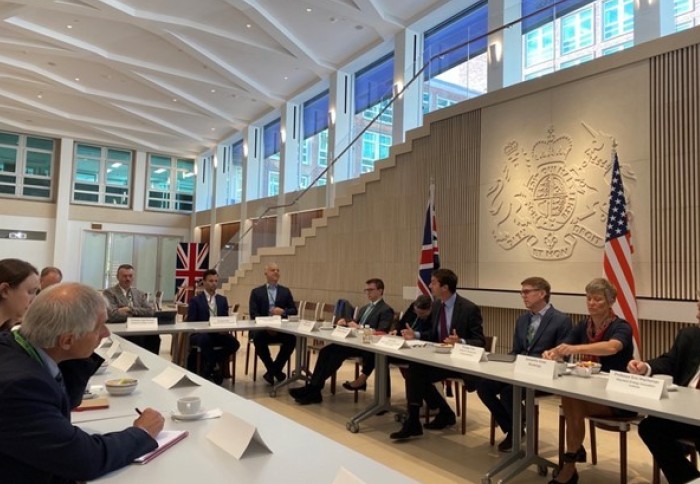Imperial academic inducted into the US National Academy of Engineering
by Pete Ford

Professor Nigel Brandon was inducted into the National Academy of Engineering and discussed hydrogen and the future of fuel at event in Washington DC
Hydrogen is likely to be important contributor to low carbon economies, however there is still work to do Professor Nigel Brandon OBE told US Delegates at an event in Washington DC.
Professor Nigel Brandon OBE was officially inducted into the National Academy of Engineering (NAE) in Washington D.C. being recognised for his contributions on solid oxide fuels and their technological development and commercialisation. It is considered one of the highest distinctions awarded to engineers, celebrating those who have made outstanding contributions to their field including pioneering new and developing fields of technology or driving innovative approaches to engineering.
International Discussions
 As part of Professor Brandon’s induction, Imperial College London hosted a roundtable event in partnership with the British Embassy in Washington, D.C. to discuss innovations in electrochemical technology for the Low Carbon Transition. Professor Brandon, Dean of Engineering at Imperial College London gave delegates a talk on the potential hydrogen has in helping achieve net zero targets, its associated challenges as well as what we can do to accelerate the innovation and deployment of these technologies.
As part of Professor Brandon’s induction, Imperial College London hosted a roundtable event in partnership with the British Embassy in Washington, D.C. to discuss innovations in electrochemical technology for the Low Carbon Transition. Professor Brandon, Dean of Engineering at Imperial College London gave delegates a talk on the potential hydrogen has in helping achieve net zero targets, its associated challenges as well as what we can do to accelerate the innovation and deployment of these technologies.
He was joined by a wide range of stakeholders including Dr Ned Stetson, Program Manager of Hydrogen Technologies at Department of Energy (DOE), Samantha Gross, Director of Energy Security and Climate Initiative at The Brookings Institution, and Dr Demetrios Papathanasiou, Global Director for the World Bank’s Energy and Extractives Global Practice as principal respondents. Professor Brandon then invited participants to speak to the role of universities in working with government and industry to drive the science behind low carbon energy solutions.
Professor Brandon said of the discussion: “The production, storage, distribution and end use of low carbon Hydrogen and its carriers will make an important contribution to the low carbon transition.”
Although almost all of today’s hydrogen is produced by fossil fuels, a future system in conjunction with renewable energy generation could create a hydrogen economy to supply buildings, transport and industry with clean energy.
Key Challenges
However, the scale of the task the UK faces to reach its emissions commitments is considerable with substantial changes needed in both consumption and behaviours. Participants reflected on the challenges that the use of hydrogen as a fuel continues to pose. Minimising harmful leakages from hydrogen infrastructure, and mitigating the risks of flammability would be vital in ensuring its successful adoption as a replacement fuel.
Hydrogen has the potential to be an important contributor to Net Zero
Despite the challenges, the potential role that hydrogen can play in a low carbon future is exciting and wide collaboration is required to develop these solutions. The event was held at an opportune time with the US Government recently launching a major hydrogen initiative and Imperial and MIT launching a new round of their joint seed fund for climate solutions, allowing Professor Brandon to expand the talk in his research areas and spark important roundtable discussions with international colleagues from academia and industry.
Professor Brandon said “Imperial, and the UK more widely, has long standing research in this field, and the US has recently made a major commitment to this area, and so it was great to be able to discuss the policy and technological implication of this with colleagues from a number of key organisations within the US, for which the support of the British Embassy was especially helpful.”
Article text (excluding photos or graphics) © Imperial College London.
Photos and graphics subject to third party copyright used with permission or © Imperial College London.
Reporter
Pete Ford
College Headquarters